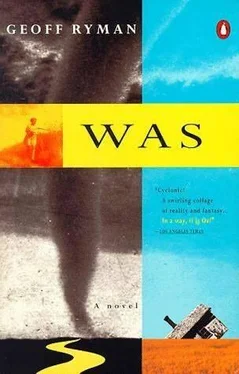Dorothy knew all of those things as if they had never gone, as if all she had to do was come here on a visit and find them there, solid, to be used. She looked at her father's face.
"Muy linda," he said, and smiled at her. It was Spanish, but Dorothy understood. He smiled at her. Her father's smile was not to be trusted. He was so young, young and handsome and not to be held by anything, even love. Everything about him was true, true to the point of cruelty.
"This is just a memory," her father said. "Here and then gone. But you have to remember, to have a heart, to have a brain. You have to remember in order to be brave. That's how you grow up."
"But all you've got," said her mother, who was pretty and quite tough, "is now."
Time left you in another world where everything was different, even you. Memory held it together. So where was home?
Her mother's face crumpled with a tolerant, forbearing smile, and she leaned forward and kissed Dorothy on the forehead and said, "Look around you, Dorothy."
And Dorothy looked and saw she was lashed to a fence post in Kansas. It was as if she had made a stupid mistake. She had been in a field in Kansas all along, and it was full of wildflowers. They were tiny, red and white and blue, scattered by the wind. And there was the sky, blue, streaked with pale white.
The world was haunted. It needed to be haunted. The Land of Was was cradled in the arms of Now like a child. Was made Now tender. Death made life precious. The wildflowers were shriveling and they shook in the dry wind. Dorothy looked down and saw the theater dress, brown and stained, still hugged to her breast.
Dorothy heaved her legs out of the mud. Thick and glossy, mud coated Aunty Em's pioneer green. Dorothy unwound the wire from around herself and stood up and looked around her, feeling the dust caked on her face, and she grinned. The world was always beautiful. With a light heart she turned and began to walk, to anywhere.
Through those same fields, Bill Davison tramped up and down. The police were there with dogs now and the sky was orange. It was going to rain. Sunlight peeked under the shelf of clouds. The bald hill was green and red.
You can't just disappear, Bill told himself. The dogs will find him somewhere. He felt humbled by the world, by Jonathan himself. This was what Jonathan wanted, Bill told the fiery light on the hillside. He wanted to stay here. He wanted to disappear. He wanted to find Oz.
Do you believe in miracles?
The rain came, cold, in huge drops that splattered over Bill's bare arms, his striped shirt. The scent of running footsteps would be washed away from the fields. Bill looked up and saw the sunlight broken by rain. He saw rainbows, a corridor of them all along the valley, parallel to the hills, lined up over the straight, flat Kansas road. On his right he saw the sun, and all the sky there had flared orange. This is the rainbow too, he thought, this is what it looks like when you stand in a rainbow. For someone else.
"Oh, Jesus," he murmured, in astonishment, in wonder. He started to pray and found he didn't need to. Kansas prayed for him.
It moved inside his eyes. The hills seemed to rear back, pull away, and swell in size. His own eyes seemed to swell, like balloons. The fields seemed to rear up, their even, man-made rows distorted. The whole land rose up like a wave, and he could see it, bearing them all along with it, the police cars like surfboards, the people balanced precariously, space and time moving as one, a never-ending wave that never broke. The hillsides gaped their mouths and furrowed their brows. The hillsides had a face.
Something huge in the land, like a shark, like a whale, moved past him. Sparing him? A living land that was also a person. After a lifetime of prayer, Bill Davison had finally had a vision. Of God?
And Dynamite Dot lay in the snow, beating her angel wings, the snow cupped in her fingers as thick as air. She was flying and singing and dying at the same time, and she was looking up at the winter stars in a sky that was clearing, but snow still fell, fell past her face as if she were moving through the midst of stars. The stars spoke to her.
"Dah do la ti sang," they said. "Ming ming ming."
They had voices like bells. They were not stars or snow, Old Dynamite realized. They were people.
And Ira Mildvan read a newspaper ringed around with handwritten words:
M'dearest Ox [it began]
You came to see me this morning. You were waiting by the Coke machine. You were 20 years old in blue jeans and you had thick hair, and wire-rim spectacles. You were the Ira who was going to become a lawyer to help Cesar Chavez and the lettuce pickers. Nowadays that sounds like the name of a band. I don't know if this will help, but we both changed. We both went neutral on each other. Whatever happened really wasn't your fault. I always made you do everything. I made you do too much.
It's dawn here. The air is beautiful and clear and I want to get out in it, so I'll try to write this quickly. I'm going to stay in Manhattan. It's small and quiet and friendly, and better than that, it's haunted for me. All this search for history was a search for home.
The old movie house here is called the Wareham and it's a theater supper club now with a semi-pro production of Dinner at Eight . I could die on stage in a dinner jacket. If things got too bad, I could just walk into the River Kaw, where the Kansa Indians used to cross.
I found Dorothy. Or at least, I know where she went to school. Today, Bill and I are going to look for her. Even if we do find her, nothing magical is going to happen, except that finally, the circle will be complete. Bill and I will stand where she stood, and I'll be able to stop humming those songs and flapping my arms for that part I will never play.
I keep seeing ghosts, Ira. In a dance. What would God see and hear, Ira, except a ghost dance, a chorus of people all at once, whole countries, outside time and place, all together, and alive?
Maybe you could come and visit me here.
Love, Jonathan
In 1916 a book was published in a secure and settled Kansas, called Sunflowers: A Book of Kansas Poems .
Bill Davison had a copy, and he often read it. The poets of Kansas did not write about banks or clapboard cities. They did not write about Wyatt Earp or cattle or railways or dry-goods stores. They wrote about freedom and John Brown and marching truth. They wrote about Arcadia and knew their ancient Greek. They wrote about African cities of the future ruled by black people. They wrote about Shri Khrishna.
On his return from Kansas, Bill Davison reread the book and came with a start upon a poet who signed herself E. A. Branscomb.
For Aunty Em, the Kansas wind was like the brush of a child's eyelash on her cheek. The teeth of the river gnawed the banks, hungry for land. She had visions of Indians rising from the dust, poppies springing from their spectral feet.
In one poem, an old woman paces the hollow, thumping floorboards of her house late at night, unable to sleep. Then she hears the laughter of a child. She opens the door and sees only darkness and calls out "Dodo?"
Outside her door is a town. An electric light shines on her porch. Somewhere in the night she hears the creak of wagon wheels, the protest of an ox under a yoke. Creeping out of the darkness toward her and into the electric light come the tired faces of those long gone, men and women in plain dress, standing amid the new, not surprised, not confused or outraged. Simply standing.
Rose Lawn Farm, near Syracuse, New York-Summer 1861
It's always best to begin at the beginning. -The Good Witch
There were chickens at Rose Lawn and china soldiers. The hens were brown and white with feathers cleaner than sheets. They were alive. The soldiers were tiny and perfect, and for Frank they were alive as well.
Читать дальше












